| Srl | Item |
| 1 |
ID:
149196
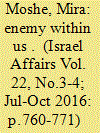

|
|
|
|
|
| Summary/Abstract |
Voting behaviour is often constructed by candidates’ ability to manipulate and set in motion voters’ social ‘nervous system’ by means of juxtaposing two social groups – ‘ours’ and ‘theirs’ – against one another. In the Israeli political arena, this means a sociopolitical ‘zero sum’ game between the right wing and the left wing. The present article seeks to decode the characteristics of right-wing vs. left-wing cognitive metaphors activated in the 2015 Israeli elections. Findings indicate that both sides sought to activate cultural schemes based on a sense of local belonging and social identity, with the emotional discourse focused on identifying and excluding internal enemies (i.e. those who are not ‘us’ or belong to ‘our group’).
|
|
|
|
|
|
|
|
|
|
|
|
|
|
|
|
| 2 |
ID:
130951
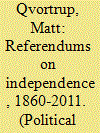

|
|
|
|
|
| Publication |
2014.
|
| Summary/Abstract |
There have been more than 50 independence referendums since the middle of the 19th Century when Texas, Virginia and Tennessee-albeit unsuccessfully-voted to leave the USA. A handful of plebiscites were held in each decade after 1945, but most independence referendums were held after the break-down of communism. Most have resulted in majorities for independence. However, such plebiscites have been rare in countries with established systems of democratic government and the results may not be a fair reflection of the views of the voters. When referendums have been held in democratic countries, they have often resulted in a no-vote (though Montenegro is an exception to the rule). Referendums have on a few occasions resulted in the exacerbation of ethnic conflict, such as in Bosnia-Herzegovina and in East Timor. But generally speaking referendums are not correlated with civil war; indeed, war resulted in only 13 percent of the cases.
|
|
|
|
|
|
|
|
|
|
|
|
|
|
|
|
| 3 |
ID:
132967
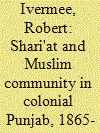

|
|
|
|
|
| Publication |
2014.
|
| Summary/Abstract |
This paper argues that concerns for the government appointment of qazis, officers for the administration of Muslim law, and the greater application of shari'at critically shaped Muslim community formation in later nineteenth century Punjab. Between 1865 and 1885, Punjabi Muslim elites attested the necessity of qazis being appointed by government and Muslim law being administered in the colonial judicial system. With the support of Gottlieb Leitner, registrar of the Punjab University College, Muslim parties used the emergent associations of Punjab civil society, including the Anjuman-i-Punjab (Lahore) and Anjuman-i-Islam (Lahore), to assert the indispensability of religious law. In doing so, they challenged the Anglo-Indian decision to prioritize customary law in the Punjab and advanced the religious group as the basic social unit of Punjab society. In Punjab public spaces, the relevance of Islam was proclaimed, challenging the professed Anglo-Indian distinction between private and public, religious and secular spheres. However, demands for qazi appointment and the administration of shari'at problematize well-rehearsed arguments about the relationships between family, community, state and religion in colonial Punjab. Only through an enquiry into the two decades after 1865 may later political campaigns for the application of shari'at be understood.
|
|
|
|
|
|
|
|
|
|
|
|
|
|
|
|
| 4 |
ID:
121628
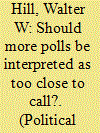

|
|
|
|
|
| Publication |
2013.
|
| Summary/Abstract |
During political campaigns the spread between the popularity of the candidates is a common metric capturing the state of the horse-race feature of the campaign. One candidate is said to be ahead of another by an indicated number of percentage points. If the difference is less than the margin of error, the race is considered too close to call. In two-person races, however, the spread corresponds to a much smaller confidence level than is usually reported because the two numbers used to compute the spread are not independent. The size of the confidence interval that is typically reported is incorrect by a factor of two. Therefore, some spreads that are reported as decisive are races too close to call.
|
|
|
|
|
|
|
|
|
|
|
|
|
|
|
|
| 5 |
ID:
158820
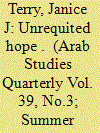

|
|
|